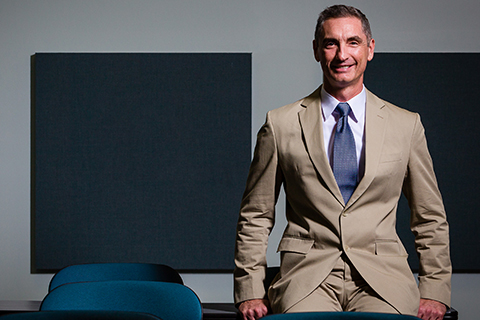Frost School of Music professor and director of undergraduate music education Carlos Abril, B.M. ’93, was one of the thought-leaders selected to participate in critical discussions and brainstorming on equity in education at Yale’s sixth Symposium on Music in Schools. The culmination of the work will result in a published journal article or declaration, focusing on strategic methods to ensure that every child across America has access to an active music life.
“We’ve been having the conversation about the value of music education for decades,” Carlos stated, and offering that the declaration that’s crafted needs to have an impact that previous efforts have not. Among the participants were public school and university teachers and administrators, foundation leaders, music-education scholars, and public-policy experts.
“I think we need to send a strong message speaking to the importance of training, mentoring, and showing that it’s more than just lip service, more than just a pet project.” “Those working in music education,” Abril said, “need to be committed to social justice in our work. I hope it will have a major mark in the field of music and music education, at large.”
Tell us about your studies here at UM and becoming a professor?
I studied music education at the School of Music as an undergraduate at the University of Miami. During those years I felt stimulated and supported by my professors in all my music performance, artistitic, and academic pursuits. UM was a place where I could puruse interests and curiosities as diverse as music composition and philosophy, to music performance and cultural studies. More doors were opened for me in four years at UM than I could have ever imagined possible. After my studies at UM, I went on to attain an M.M. in peformance from Cincinnati Conversatory of Music and later a Ph.D. in music education at The Ohio State University. Inbetween those years of study, I played music professionally in orchestras and taught music in Florida and Ohio. After earning my PhD at Ohio State I was hired as a professor at Northwestern University. In all my years as a tenured professor at Northwestern University, the only other position I had considered was a professorship at the UM Frost School of Music. Coming back to UM was like coming home after almost 20 years. Not only was it a desire to come home but it was also an opportunity to work in a progressive and innovative School of Music, preparing leaders in the field of music education who are committed to community engagement and social justice.
Can you share the importance of music education and the integration and connection to learning?
Learning music is an essential part of being human, and as such, is an essential human right. All children, deserve an equal opportunity to learn in and through music. Music is a unique way of knowing the world, of understanding others, and of understanding one's self. In any civil society, school should be the place to offer such experiences. The music education program at Frost prepares students to become music educators - people who design music curriculum and teach music in schools and community centers. It also prepares scholars who are interested in researching multiple facets of music teaching and learning.





